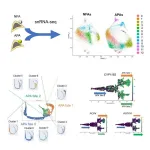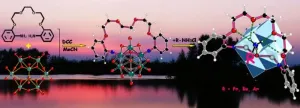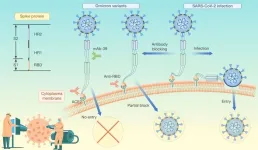(Press-News.org) A £2.5m grant will enable a new network driving research into metamaterials, headed up by a researcher from the University of Warwick.
Metamaterials have phenomenal potential. They are artificial 3D structures comprised of at least two different materials. This combination and the structure give metamaterials properties beyond those of the materials used to make them. These properties may be electromagnetic, acoustic, magnetic, mechanical/structural, thermal, or chemical.
Metamaterials could transform our economy in a digital age, helping to address society’s challenges by contributing to manufacturing in areas of sustainability, health care, communications, defence and security, computation techniques, and the space and aviation industries.
Now, thanks to funding by the Engineering and Physical Sciences Research Council (EPSRC), a branch of UK Research and Innovation (UKRI), 13 universities and five organisations will lead on enhancing the UK’s capabilities in creating novel and innovative metamaterials.
The UK Metamaterials NetworkPlus will build on the work of the UK Metamaterials Network, which was established in 2021. It will be co-led by Dr Claire Dancer, Reader, WMG at The University of Warwick, and Professor Alastair Hibbins, Director of the University of Exeter’s Centre for Metamaterial Research and Innovation, alongside a team of co-project leads from across the UK.
The EPSRC grant will run for over four years, beginning on 1 March 2024, and will help develop game-changing breakthroughs. It will build the UK’s skills pipeline, driving through generation-after-next technology and high-value products.
Warwick will lead on researching manufacturing challenges for metamaterials, such as co-processing challenging combinations of materials and establishing routes for scaled-up production of metamaterials currently made by non-scalable processes, building on the University’s strong expertise across the materials manufacturing sector and existing High Value Manufacturing Catapult activities at WMG.
Dr Dancer said: “We’re really excited by this additional funding from EPSRC. Not only are we now able to continue supporting our community, but we are now going to be able to offer pump-prime funding for a number of priority projects that are strategically important to us. That’s across fundamental science, manufacturing, and industrially relevant research – ultimately strengthening the role that metamaterials play in the UK’s science and technology portfolio, driving further investment into our area, and ensuring the UK benefits from our academic excellence on the global stage.”
Professor Alastair Hibbins, project lead of the NetworkPlus, and Director of the University of Exeter’s Centre for Metamaterial Research and Innovation said: “The scope of metamaterials is huge; metamaterials as a concept provides the opportunities to control information and energy through careful structuring of conventional materials. But of course, ‘information’ and ‘energy’ are very general terms and cover an enormous range of devices; what we really mean is heat, fluid-flow, light, vibration, sound, radar, relevant to technologies such as communication, computing, electronics, health, sustainability, and defence. This breadth in science and application has meant that the excellence in our academic community has been incredibly diverse but not joined-up.
“For the last few years, Dr Claire Dancer from WMG at The University of Warwick, and I have co-led the Network, and with the funding and support from EPSRC and The Defence Science and Technology Laboratory (Dstl), we’ve been working incredibly hard to forge a new UK ecosystem for metamaterials where we work together to support each other, and drive work into areas that require multidisciplinary approaches to solve global challenges.”
The UK Metamaterials NetworkPlus will drive an increase to UK research in this vital technology area. It will bring together experts from academia, industry, and government to accelerate progress towards the UK’s technological priorities. It has an essential role to play in maintaining and growing UK leadership in discovery science on the global stage.
The NetworkPlus will formally launch at the Metamaterials UK Conference and Forum 19th-23rd May 2024.
For more information, visit: http://metamaterials.network
ENDS
Notes to editors
About WMG, University of Warwick
WMG is a world leading research and education group, transforming organisations and driving innovation through a unique combination of collaborative research and development, and pioneering education programmes.
As an international role model for successful partnerships between academia and the private and public sectors, WMG develops advancements nationally and globally, in applied science, technology and engineering, to deliver real impact to economic growth, society and the environment.
WMG’s education programmes focus on lifelong learning of the brightest talent, from the WMG Academies for Young Engineers, degree apprenticeships, undergraduate and postgraduate, through to professional programmes.
An academic department of the University of Warwick, and a centre for the HVM Catapult, WMG was founded by the late Professor Lord Kumar Bhattacharyya in 1980 to help reinvigorate UK manufacturing and improve competitiveness through innovation and skills development.
www.warwick.ac.uk/wmg
About the UK Metamaterials NetworkPlus
The UK Metamaterials NetworkPlus aims to develop the UK’s potential as a thriving, innovation driven, research and industry base. To do this the NetworkPlus aims to:
bring together the current and next generation of academic, start-up and industry leaders in the UK, and open the field beyond its traditional boundaries;
provide a reliable nexus for information, experts and cutting-edge science and technology;
support pilot and explorative projects to initiate research areas which are new to the UK or strategically important;
support the development of close links between government, academics and industry, providing a strong advocacy for metamaterials activities;
work to create a strong regulatory framework and shape international norms and standards;
showcase metamaterials potential, growing its potential in the UK.
Co-project leads for the award are based at the University of Exeter, the University of Warwick, the University of Cambridge, the University of Sheffield, Manchester Metropolitan University, and the University of St Andrews.
Members of the leadership team are also based at Sheffield Hallam, Queen Mary University, the Defence Science and Technology Laboratory (Dstl), MBDA Systems, Imperial College London, Manchester Metropolitan, the University of Nottingham, M. Ventures, QinetiQ, Durham University, and the National Physics Laboratory (NPL).
Media contact
University of Warwick press office contact:
Annie Slinn 07876876934
Communications Officer | Press & Media Relations | University of Warwick Email: annie.slinn@warwick.ac.uk
END
Warwick to benefit from £2.5 million funding into “phenomenal” metamaterials
A £2.5m grant will enable a new network driving research into metamaterials, headed up by a researcher from the University of Warwick.
2024-03-01
ELSE PRESS RELEASES FROM THIS DATE:
More schooling is linked to slowed aging and increased longevity
2024-03-01
Participants in the Framingham Heart Study who achieved higher levels of education tended to age more slowly and went on to live longer lives as compared to those who did not achieve upward educational mobility, according to a new study at Columbia University Mailman School of Public Health and The Robert N. Butler Columbia Aging Center. Upward educational mobility was significantly associated with a slower pace of aging and lower risk of death. The results are published online in JAMA Network Open.
The Framingham Heart Study is an ongoing observational study first initiated in 1948 that currently spans three generations.
The Columbia analysis is ...
Trends in recurring and chronic food insecurity among US families with older adults
2024-03-01
About The Study: The results of this study highlight how rates of recurring and chronic food insecurity among families with older adults rose substantially over the past 20 years. Monitoring national trends in food insecurity among older adults has direct programmatic and policy implications.
Authors: Cindy W. Leung, Sc.D., M.P.H., of the Harvard T.H. Chan School of Public Health in Boston, is the corresponding author.
To access the embargoed study: Visit our For The Media website at this link https://media.jamanetwork.com/
(doi:10.1001/jamahealthforum.2023.5463)
Editor’s ...
Self-reported everyday functioning after COVID-19 infection
2024-03-01
About The Study: The findings of this study of 372 veterans suggest that the negative impacts of the COVID-19 pandemic on everyday function may occur via multiple pathways regardless of whether or not they had a documented infection with COVID-19. Future work with larger samples is needed to validate the estimated associations.
Authors: Theodore J. Iwashyna, M.D., Ph.D., of Ann Arbor VA in Ann Arbor, Michigan, is the corresponding author.
To access the embargoed study: Visit our For The Media website at this link https://media.jamanetwork.com/
(doi:10.1001/jamanetworkopen.2024.0869)
Editor’s ...
The surprisingly complex inner workings of an endocrine tumor
2024-03-01
Researchers from Tokyo Medical and Dental University (TMDU) find that the cells that make up aldosterone-producing adenomas become more transcriptionally active and express higher levels of genes linked to hormone production over intratumoral differentiation.
Tokyo, Japan – There is strength in teamwork, and it turns out that this applies to tumors, too. Researchers from Japan have reported that different types of cells within a single benign tumor may work together to promote the tumor’s growth.
In a study published this ...
Safety assessments for older drivers would benefit from introducing spatial orientation tests
2024-03-01
Older drivers who have worse spatial orientation ability experience greater difficulty when making turns across oncoming traffic, according to new research from the University of East Anglia (UEA).
Spatial orientation skills are the combination of skills that enable us to mentally determine our position, or the position of our vehicle and other vehicles, relative to the environment.
Lead author Sol Morrissey, a PhD researcher at UEA’s Norwich Medical School, said: “Driving safety is typically reduced in older adults due to changes that take place during ...
New type of metallacrown ether, polyoxometalatocrown ether, opens research opportunities
2024-03-01
Crown ethers were discovered in 1967. They were then modified by adding a metal-containing unit creating metallacrown ethers. These metallacrown ethers have been the subject of intensive research. Depending on the molecular makeup of the metallacrown ethers and their resultant architecture, the properties and therefore the uses of the metallacrowns can change. They have many different uses currently, and ongoing studies continue to expand their application. Just a few of these include magnetic refrigeration, imaging agents—specifically as potential contrast agents in magnetic resonance imaging—and single-molecular ...
A protective human monoclonal antibody targeting a conserved site of spike glycoprotein of SARS-CoV-2 Omicron variants
2024-03-01
The ongoing COVID-19 pandemic caused by SARS-CoV-2 has caused serious damage to public health and the global economy, and one strategy to combat COVID-19 has been the development of broadly neutralizing antibodies for prophylactic and therapeutic use. The most emergency-use authorized (EUA) therapeutic monoclonal antibodies, are more likely to lose their neutralizing activities as the viral epitopes (e.g. the receptor-binding domain, RBD) within spike protein of SARS-CoV-2 they target are more prone to mutate. By contrast, the S2 subunit of spike protein, has a much lower frequency of mutation than ...
Scientists reveal how our cells’ leaky batteries are making us sick
2024-03-01
Researchers have discovered how “leaky” mitochondria – the powerhouses of our cells – can drive harmful inflammation responsible for diseases such as lupus and rheumatoid arthritis. Scientists may be able to leverage the findings to develop better treatments for those diseases, improve our ability to fight off viruses and even slow aging.
The new discovery reveals how genetic material can escape from our cellular batteries, known as mitochondria, and prompt the body to launch a damaging immune response. By developing therapies to target this process, doctors may one day be able to stop the harmful inflammation ...
Ultraviolet radiation from massive stars shapes planetary systems
2024-03-01
To find out how planetary systems such as our Solar System form, an international research team including scientists from the University of Cologne studied a stellar nursery, the Orion Nebula, using the James Webb Space Telescope (JWST). By observing a protoplanetary disc named d203-506, they discovered the key role massive stars play in the formation of planetary systems that are less than a million years old. The study, led by Dr Olivier Berné from the National Centre for Scientific Research (CNRS) ...
Can a purposeful walk intervention with a distance goal using an activity monitor improve individuals' daily activity and function post total hip replacement surgery? A randomized pilot trial
2024-03-01
A research paper by scientists at Bournemouth University proposed a randomized pilot trial, which aimed to determine the effect of an intervention where outdoor walking distance is used as a goal to increase daily activity of older adults using a commercial activity monitor at 3 to 6 months post total hip replacement (THR).
The new research paper, published on Nov. 30 in the journal Cyborg and Bionic Systems, indicated the participants in the intervention group had higher activity levels after THR, compared to those in the control group. The Cohen’s effect ...
LAST 30 PRESS RELEASES:
Doctors and nurses believe their own substance use affects patients
Life forms can planet hop on asteroid debris – and survive
Sylvia Hurtado voted AERA President-Elect; key members elected to AERA Council
Mount Sinai and King Saud University Medical City forge a three-year collaboration to advance precision medicine in familial inflammatory bowel disease
AI biases can influence people’s perception of history
Prenatal opioid exposure and well-being through adolescence
Big and small dogs both impact indoor air quality, just differently
Wearing a weighted vest to strengthen bones? Make sure you’re moving
Microbe survives the pressures of impact-induced ejection from Mars
Asteroid samples offer new insights into conditions when the solar system formed
Fecal transplants from older mice significantly improve ovarian function and fertility in younger mice
Delight for diastereomer production: A novel strategy for organic chemistry
Permafrost is key to carbon storage. That makes northern wildfires even more dangerous
Hairdressers could be a secret weapon in tackling climate change, new research finds
Genetic risk for mental illness is far less disorder-specific than clinicians have assumed, massive Swedish study reveals
A therapeutic target that would curb the spread of coronaviruses has been identified
Modern twist on wildfire management methods found also to have a bonus feature that protects water supplies
AI enables defect-aware prediction of metal 3D-printed part quality
Miniscule fossil discovery reveals fresh clues into the evolution of the earliest-known relative of all primates
World Water Day 2026: Applied Microbiology International to hold Gender Equality and Water webinar
The unprecedented transformation in energy: The Third Energy Revolution toward carbon neutrality
Building on the far side: AI analysis suggests sturdier foundation for future lunar bases
Far-field superresolution imaging via k-space superoscillation
10 Years, 70% shift: Wastewater upgrades quietly transform river microbiomes
Why does chronic back pain make everyday sounds feel harsher? Brain imaging study points to a treatable cause
Video messaging effectiveness depends on quality of streaming experience, research shows
Introducing the “bloom” cycle, or why plants are not stupid
The Lancet Oncology: Breast cancer remains the most common cancer among women worldwide, with annual cases expected to reach over 3.5 million by 2050
Improve education and transitional support for autistic people to prevent death by suicide, say experts
GLP-1 drugs like Ozempic could cut risk of major heart complications after heart attack, study finds
[Press-News.org] Warwick to benefit from £2.5 million funding into “phenomenal” metamaterialsA £2.5m grant will enable a new network driving research into metamaterials, headed up by a researcher from the University of Warwick.





